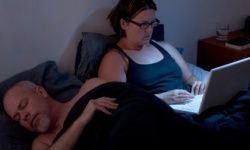In a culture that simultaneously values productivity and distraction, many of us find ourselves cutting corners on our nightly allotment of sleep. While it's easy to view the loss of a few hours of sleep as no big deal, over time, the lost hours build up and form a sleep debt. After several days of inadequate rest, we begin thinking muddled thoughts, getting upset over trivial matters and even seeing things that aren't there. We're experiencing sleep deprivation.
There are many symptoms of sleep deprivation affecting our bodies and our brains. Sleep deprivation can be a source of domestic unhappiness, career shortcomings and potentially life-threatening situations.
Advertisement
So what are 10 signs you may be sleep deprived? Slap yourself in the face a few times, and then keep reading to find out.



